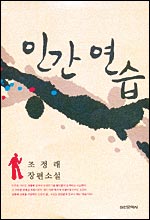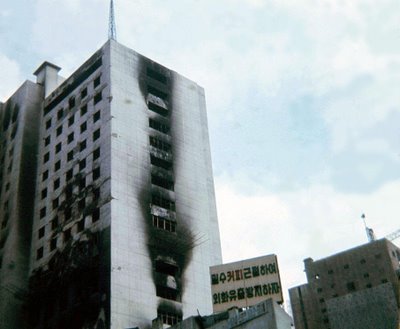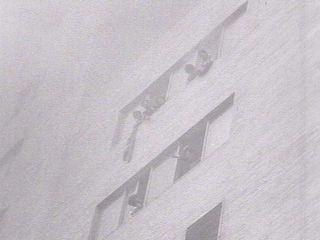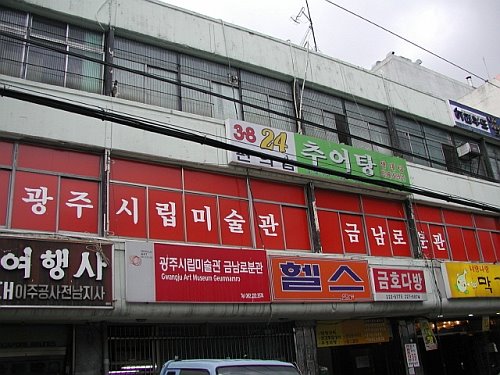Son Seok-chun, former member of Hankyoreh editorial board and a current occasional writer for the paper, tells in his latest column about stories of rehabilitation (see the same text with comments also in his blog) in DPRK of Pak Hon-yong (Pak Hôn-yông), the Southern-born communist leader who went over to the North before the establishment of separate states, was a member of the early DPRK leadership and was given the responsibility for the failures of the Korean War and executed in 1955 for having been a "spy for the American imperialists".
Chun, whose good faith in DPRK is unwavering, quotes Pak Hôn-yông's son, the buddhist monk Wongyeong who lives in ROK, that Pak's grave in the North would have been made into a kind of a memorial park. Wongyeong would have heard about this from northerners who've visited Yenbien.
In one sense, this is unbelievable and unconceivable. Rehabiliting Pak Hôn-yông would mean admitting the fallibility of the Party and the Leader (Kim Il-sung), and as much as people of good faith like Son would like to believe that DPRK has changed so much as to admit that Kim Il-sung and the Worker's Party has been wrong, I see nothing pointing to that. Son remarks that there've been many cases in the history of communism that the mistakes of the party have been corrected. Sure, but they've been after major overhauls in the leadership and easening of dictatorship and totalitarianism, but where is that in DPRK? A secret speech of the new leader in the party congress condemning the "excesses" and "breaches of people's democratic legalism"? Stalin's son (did he have one?) didn't continue his father's rule.
This also leaves me thinking that there might be some good disinformation spreading going on, especially as Son conveys the claim that rehabilitation of Pak Hôn-yông would have been ordered by Kim Il-sung "just before he closed his eyes" (yes, Son writes like that, 눈감기 직전에 내린 명).
On the other hand, wouldn't it be good news if DPRK really would be rehabiliting Pak Hôn-yông and abandoning the infallibility of the two Kims (father and son) and the Party? (Where does that leave the army?) Unification must be right around the corner!
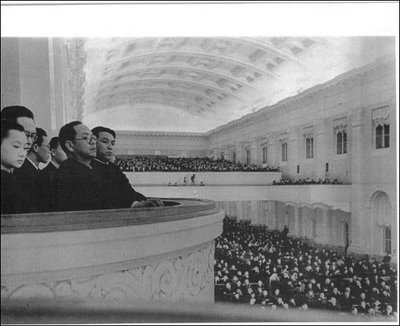
Moscow, March 1949: Pak Hôn-yông in the middle wearing glasses, Kim Il-sung to his left (notice how I've chosen the photograph to convey a certain impression of Pak). Photograph from "Korean War in Photographs" serial in Ohmynews.
Does Pak Hôn-yông deserve reassessment? Perhaps he deserves credit for pro-independence activity during the colonial period, but his participation in the creation of the DPRK dictatorship and his responsibility for the Korean War should discredit him for any role in the improvement of South-North relations, as the columnist Son seems to wish. For someone like Son Seok-chun who gets so elated just for the thought of "revolution", Pak Hôn-yông is laudable only for having been a revolutionary, dictatorship nonwithstanding. Others, like me, will prefer dictatorship and dictatorial ideology as the basis of assessment.
Update.
I left the following comment to Song's column at his own site:
Original:
북한의 대남 선전사이트인 <구국전선>에서만 (http://ndfsk.dyndns.org/) 여태까지 박헌영을 언급할 때마다 "간첩"이란 말이 나옵니다. 김일성의 업적 중에도 하나는 52년의 박헌영 간첩단의 적발이기도 합니다. 이것을 조선민주주의인민공화국이 갑자기 남조선과 관계를 개선하기 위해서 재평가하겠습니까? 김일성의 아들임으로 지도자가 된 김정일은 아버지가 적발한 간첩이 그게 아니라고 선언하겠습니까?
당의 오류를 바로잡은 경우가 공산주의 역사에서 많다고 하시는데, 그런 사례들은 큰 변화가 있은 다음에만 가능했었지요. 예를 들면 스탈린 이후의 흐루쉬체브의 56년의 스탈린의 만행을 규탄한 연설이나 소련을 개혁하고자 했던 고르바초프의 경우엔 그랬었지만 북한에서 그런 것이 가능하지 못 합니다.
박헌영이 북한에서 재평가되고 있다는 말씀은 간접적으로 북한 체제가 무너지고 있다는 뜻이라면 또 경우가 다르겠지만요... | In English:
In the North Korean propaganda site against the South, "National Saving Front", Pak Hôn-yông's name has this far not been mentioned without the adding "spy" to it. And one of Kim Il-sung's deeds has been to detect Pak Hôn-yông's spy ring in 1952. Would the Democratic People's Republic of Korea reconsider this in order to improve relations with South Korea? Would Kim Jong-il, who became a leader for being his father's son, declare that the spy his father caught wasn't that?
You said that there had been cases in the history of communism where the party has corrected its mistakes. Those cases have always taken places after big changes. It's been the case for example in Khrushchev's secret speech in '56 condemning Stalin's misdeeds or in Gorbachev's attempts to reform Soviet Union, but that won't be possible in North Korea.
Unless, by saying that Pak Hôn-yông is being reassessed in North Korea you indirectly mean that the Northern system is crumbling... | |
Update, July 19, 2006.
The newest column by Mr Song is about the savagery of the Roh government, but as usual for him, much of what is wrong in South Korea stems from the press. He uses all his caliber in describing this pest of Korea - choose your own so you can talk with the progressives about Chosun, Joongang, and Donga: "rich newspapers" (puja sinmun), "reactionary press" (sugu ôllon), and "pro-american flunkey press" (ch'inmi sadae ôllon). ("Reactionary press" was also the driving force behind the South Korean decision to suspend humanitarian assistance to North Korea, if you did not happen to know.)
Categories at del.icio.us/hunjang: contemp.history ∙ minjok ∙ people ∙ DPRK |






